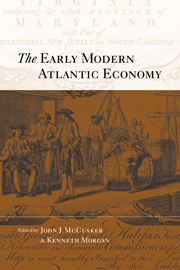Book contents
- Frontmatter
- Contents
- List of figures
- List of tables
- List of abbreviations
- List of contributors
- Dedication
- Introduction
- Part I The role of merchants and their connections
- Part II The development of trades
- 3 Property versus commerce in the mid-eighteenth-century port of London
- 4 Irish businessman and French courtier: the career of Thomas sutton, comte de Clonard, c. 1722–1782
- 5 ‘A revolution in the trade’: wine distribution and the development of the infrastructure of the Atlantic market economy, 1703–1807
- 6 Law, credit, the supply of labour, and the organization of sugar production in the colonial Greater Caribbean: a comparison of Brazil and Barbados in the seventeenth century
- 7 The revolutionary impact of European demand for tropical goods
- 8 The business of distilling in the Old World and the New World during the seventeenth and eighteenth centuries: the rise of a new enterprise and its connection with colonial America
- Part III Imperial economies
- Part IV Colonial working societies
- Index
7 - The revolutionary impact of European demand for tropical goods
from Part II - The development of trades
Published online by Cambridge University Press: 16 October 2009
- Frontmatter
- Contents
- List of figures
- List of tables
- List of abbreviations
- List of contributors
- Dedication
- Introduction
- Part I The role of merchants and their connections
- Part II The development of trades
- 3 Property versus commerce in the mid-eighteenth-century port of London
- 4 Irish businessman and French courtier: the career of Thomas sutton, comte de Clonard, c. 1722–1782
- 5 ‘A revolution in the trade’: wine distribution and the development of the infrastructure of the Atlantic market economy, 1703–1807
- 6 Law, credit, the supply of labour, and the organization of sugar production in the colonial Greater Caribbean: a comparison of Brazil and Barbados in the seventeenth century
- 7 The revolutionary impact of European demand for tropical goods
- 8 The business of distilling in the Old World and the New World during the seventeenth and eighteenth centuries: the rise of a new enterprise and its connection with colonial America
- Part III Imperial economies
- Part IV Colonial working societies
- Index
Summary
The history of early modern western Europe is experiencing an identity crisis. More and more frequently, the question crops up as to whether the appropriate unit of analysis is nation state or empire. The years from 1500 onward were a period of extraordinary overseas expansion, but the idea of empire also has added currency because, even within Europe, most states were actually conglomerations of different kingdoms, principalities and provinces, not all of which had entered the state on an equal footing. To contribute further to the unit of analysis confusion, some have suggested that, in regard to many issues, these states operated as regions of an Atlantic world and that such a world is the best conceptual framework. While Great Britain and the topic of a greater British history has occasioned the most spilling of ink on this matter, nearly all western European countries are at risk of being imagined anew or reconfigured as communities.
In keeping with this renewed interest in empire, an impressive number of books and articles on the subject of world trade and colonies have been produced over the past decade. Perhaps inspired or provoked by the great global histories of capitalism by Fernand Braudel and Immanuel Wallerstein, a transnational perspective pervades these works, which trace the expansion of western European sovereigns and the adventurers and trading companies they licensed into the Americas, south-eastern Asia and the subcontinent, and coastal Africa.
- Type
- Chapter
- Information
- The Early Modern Atlantic Economy , pp. 163 - 185Publisher: Cambridge University PressPrint publication year: 2001
- 1
- Cited by



